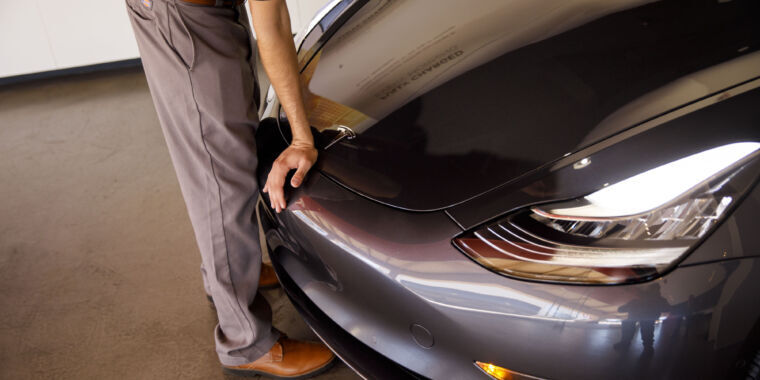The electric car manufacturer Tesla had to issue a massive recall this month to fix faulty hood latches that can open while its cars are driving. The problem affects more than 1.8 million cars, which means it’s slightly smaller than the recall in December that applied to more than 2 million Teslas.
The problem, according to the official National Highway Traffic Safety Administration’s Part 573 safety recall report, affects model year 2021–2024 Model 3s (built between September 21, 2020, and June 2, 2024), model year 2021–2024 Model Ss (built between January 26, 2021, and July 15, 2024), model year 2021–2024 Model Xs (built between August 18, 2021, and July 15, 2024), and model year 2020–2024 Model Ys (built between January 9, 2020, and July 15, 2024).
The problem first became apparent to Tesla in March of this year after complaints about unintended hood opening from Chinese customers. By April, it had identified the problem as deformation of the hood latch switch, “which could prevent the customer from being notified about an open hood state.”
Although the problem is with the hood latch, as with many Tesla safety recalls, the problem can be fixed with an over-the-air software patch. The new software is able to detect if the hood is open and, if so, will display a warning to the driver to alert them to stop their vehicle and secure the hood.



deleted by creator
I would say more annoying is to getting those alerts more and more frequently. According to the article this is a software “fix” for the lock banding and stopping functioning.
deleted by creator
It literally states the program is due to a deformation of the switch, a physical issue.
I’m sure there are ways to safely engineer around it. I don’t trust any American manufacturer to do so. What guarantee do we have that it won’t continue deforming further after the fix? What happens to the patched sensor software if it does occur?
Do you unironically trust Musk enough to not open your vehicles hood at 80mph?
Really not sure why so many people on this post are having trouble understanding that concept. Maybe they want to justify their $80k paperweight lmao.
deleted by creator
Sometimes you can.
It’s common to use a Hall effect sensor for positioning. It gives off an analog value. You might be able adjust the signal threshold that you consider to be “open” or “closed” in software.
Further, this is probably something that you just don’t spend a bunch of time engineering. Pick a value that’s well with your tolerance range and move onto harder problems. When a problem comes up, you can fine turn the range.
deleted by creator